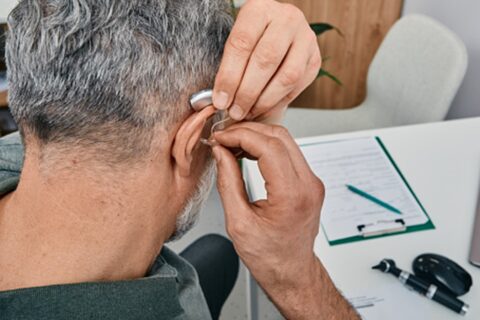The Link Between Hearing Loss and Cognitive Decline
The Link Between Hearing Loss and Cognitive Decline

It is well established that hearing loss can affect communication, social interaction, and quality of life. However, recent studies have shown that hearing loss may also be linked to cognitive decline. Cognitive decline refers to a gradual decline in cognitive abilities, such as memory, attention, and reasoning, that can occur as people age. It is a normal part of aging, and many older adults experience some degree of cognitive decline. However, in some cases, cognitive decline can be severe enough to interfere with daily life and be indicative of a more serious condition, such as dementia. About 1 in 10 people over the age of 65 have dementia, and about 1 in 3 people over the age of 85 have the condition.
Research studies have established a strong link between hearing loss and cognitive decline. A study conducted by the Johns Hopkins School of Medicine found that people with hearing loss are more likely to develop cognitive problems, including dementia, compared to those with normal hearing. The findings were startling, including:
- Mild hearing loss doubled the risk of developing dementia
- Moderate loss tripled the risk of developing dementia
- Severe hearing loss led to a risk fives times greater of developing dementia.
Another study conducted by the University of California, San Francisco, found that people with hearing loss experienced a decline in cognitive function at a rate 30-40% faster than those with normal hearing.
The exact mechanisms by which hearing loss leads to cognitive decline are not fully understood. However, researchers have proposed several possible explanations. One theory is that hearing loss leads to social isolation, which can cause cognitive decline. Another theory is that hearing loss may cause changes in the brain, leading to cognitive decline. Studies have shown that the brain areas responsible for processing auditory information are also involved in cognitive processes such as memory and attention.
Frank Lin, MD, PhD, lead researcher in the Johns Hopkins study, theorizes that “Brain scans show us that hearing loss may contribute to a faster rate of atrophy in the brain. Hearing loss also contributes to social isolation. You may not want to be with people as much, and when you are you may not engage in conversation as much. These factors may contribute to dementia.”
As you walk, your ears pick up subtle cues that help with balance. Hearing loss mutes these important signals, Lin notes. “It also makes your brain work harder just to process sound. This subconscious multitasking may interfere with some of the mental processing needed to walk safely.”
Prevention of hearing loss is essential in preventing cognitive decline. Here are some steps you can take to prevent hearing loss:
- Protect your ears from loud noise: Exposure to loud noise is one of the leading causes of hearing loss. To protect your ears, use earplugs or earmuffs when you are exposed to loud noise.
- Get your hearing checked regularly: Regular hearing tests can detect hearing loss early, making it easier to treat and prevent further damage.
- Maintain a healthy lifestyle: A healthy lifestyle can help prevent hearing loss. Eating a healthy diet, exercising regularly, and avoiding smoking can all help maintain healthy hearing.
- Treat hearing loss early: If you experience hearing loss, seek treatment early. Hearing aids and other assistive devices can help improve communication and prevent cognitive decline.
There is currently no cure for dementia, nor any way to reverse the disease. It’s important to note, though, that hearing loss doesn’t cause a person to develop dementia – but it does increase the risk. The exact mechanisms by which hearing loss leads to cognitive decline are not fully understood, but researchers have proposed several possible explanations. Taking steps to minimize hearing loss is essential in preventing cognitive decline.


